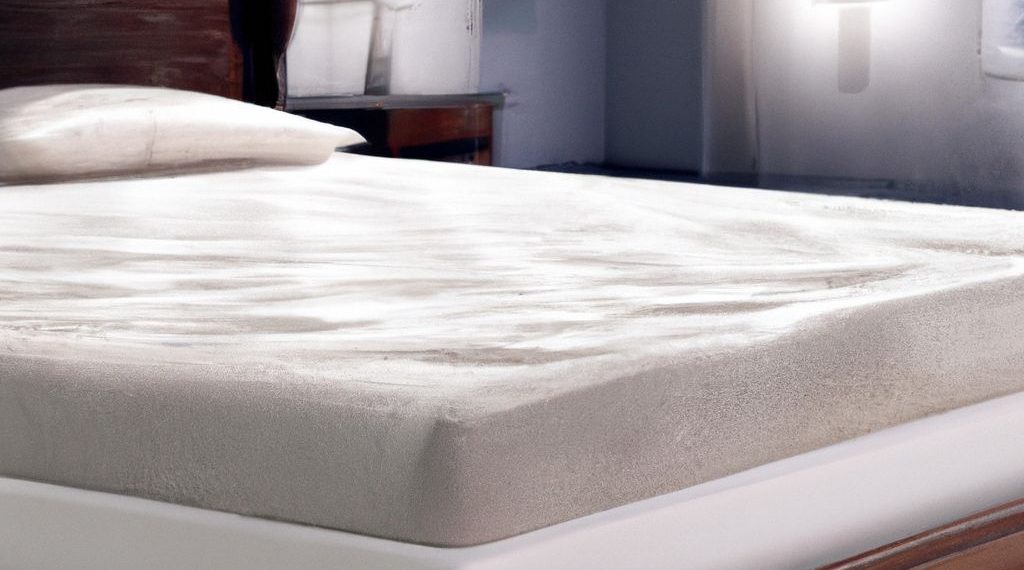Key Takeaways:
- Choosing the right thickness for a full size mattress is important for ensuring optimal sleep quality.
- The thickness of a full size mattress should be considered based on factors such as sleeping position, body weight, and comfort preference.
- Thin mattresses may be suitable for certain individuals, while others may prefer standard thickness or thick mattresses.
- Thin mattresses have benefits such as being easier to move and store, but they may lack adequate support and comfort.
- Standard thickness mattresses provide a balance of support and comfort, but may not be suitable for heavier individuals.
- Thick mattresses offer superior support and cushioning, but may be less portable and may not fit certain bed frames.
- When choosing the thickness of a full size mattress, it is important to consider your sleeping position, test different options, and seek expert advice if needed.
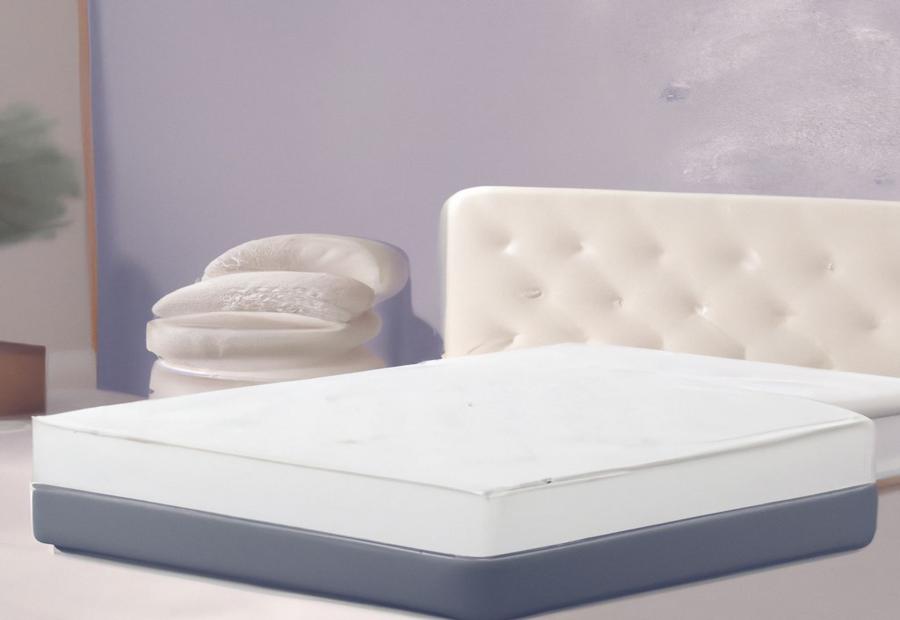
Photo Credits: Www.Mattressreviewguru.Com by Raymond Sanchez
Discover the crucial factors that determine the thickness of a full-size mattress and its impact on your sleep quality. Delve into the importance of mattress thickness and gain insights into how it can affect the overall comfort and support provided by your mattress. Uncover the significant role that mattress thickness plays in ensuring a restful and rejuvenating sleep experience.
Importance of Mattress Thickness
The importance of mattress thickness can’t be overstated. It’s key for comfort and quality of sleep. When selecting a mattress, look at: spinal alignment, pressure relief, motion isolation, support for sleeping positions, durability and longevity.
Spinal alignment is essential for a good night’s sleep. The right thickness keeps the spine aligned, reducing any potential issues. Pressure relief is another factor. A thicker mattress distributes body weight evenly, reducing stress on pressure points.
Motion transfer between sleep partners can be a disturbance. Thicker mattresses absorb more movement, leading to a peaceful sleep. Different sleeping positions need different levels of support. Choose the right thickness to provide cushioning for side sleepers or firm support for back and stomach sleepers.
Durability and longevity matter too. Thicker mattresses have more layers, making them more durable. Personal preference plays a role too. Some may prefer a firmer feel with thinner mattresses, while others may appreciate the plushness of thicker options. Find the balance between comfort and support.
So, when buying a full-size mattress, take into account factors such as spinal alignment, pressure relief, motion isolation, support needs, durability, and personal comfort preferences. This helps to choose a mattress thickness that fits sleep needs.
Impact of Mattress Thickness on Sleep Quality
Mattress thickness has a big influence on sleep quality. A thicker mattress gives more support and comfort which leads to a more restful sleep. It eases pressure points in the body, so less pain and discomfort during sleep. Plus, a thick mattress gives extra padding and cushioning which shields the body, stopping it from sinking too far into the mattress and causing spine misalignment. This helps the spine to stay in the right position, reducing the chances of waking up with aches and pains.
In addition to support and comfort, mattress thickness can also affect temperature regulation. Thicker mattresses are usually made from stronger materials which let air circulate better. This decreases heat retention and keeps body temperature lower when sleeping, making it more comfortable.
Plus, mattress thickness affects motion transfer. Thicker mattresses with added foam or padding will absorb movement better, reducing the disturbance caused by someone tossing and turning. This is great for people who share their bed.
In brief, it’s important to pick the right mattress thickness for the best sleep quality. Consider sleeping position, body weight, and comfort level when selecting the thickness. Knowing how different thicknesses impact sleep can help people make decisions that suit them.
Thin mattresses are good for those who love firm surfaces or have back/joint issues. They’re also great for people who need portability or have limited bedroom space. However, thin mattresses may not give enough cushioning and support.
Standard thickness mattresses are a popular option which offer a balance of comfort and support. They can work for many sleeping positions and body shapes. But, some people may find them too soft or too firm.
Thick mattresses, such as pillow-top or luxury models, provide the most comfort and cushioning. They are great for side sleepers and people with higher body weight, as they give better pressure relief and support. However, they are usually more expensive and may require deeper sheets.
References:
– How Thick is a Full Size Mattress
Factors to Consider When Choosing the Thickness of a Full Size Mattress
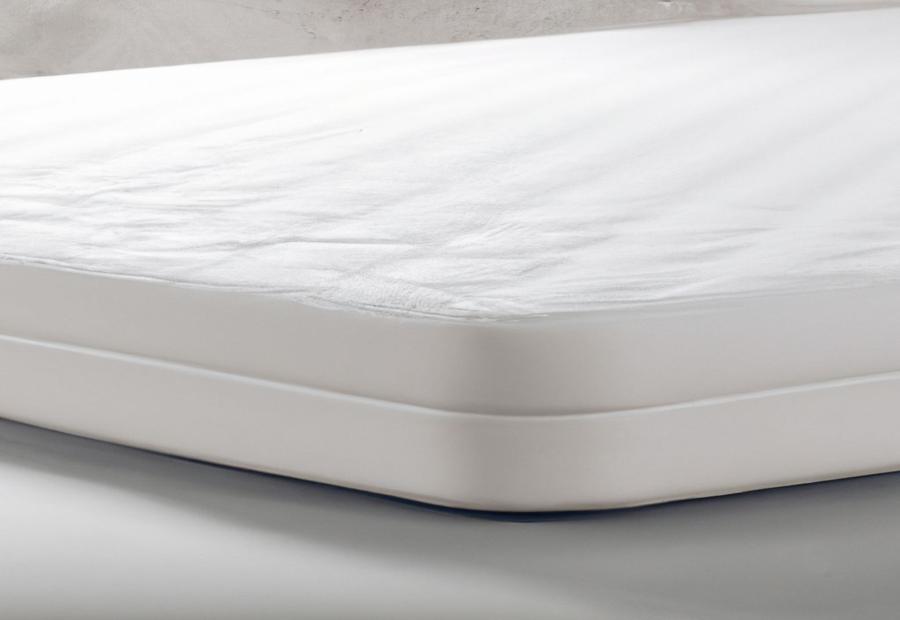
Photo Credits: Www.Mattressreviewguru.Com by Gregory Gonzalez
When it comes to choosing the right thickness for your full-size mattress, there are important factors you need to consider. From your sleeping position and body weight to your comfort preferences, each sub-section of this article will explore how these factors influence the ideal mattress thickness for a good night’s sleep. So, before you make a decision, let’s dive into the details and find out which thickness suits you best.
Sleeping Position and Mattress Thickness
The thickness of a full-size mattress can affect comfort and support when sleeping. It is important to consider this when selecting one.
– Back: Medium to thick mattresses are best for back sleepers. This helps to keep the spine aligned and avoids any pain.
– Stomach: Firm mattress with thinner padding is best for stomach sleepers. This stops the body from sinking and causing strain.
– Side: Side sleepers need contouring and plush padding. A slightly thicker mattress can offer pressure relief.
– Combination sleepers: Medium-thickness mattress suits combination sleepers. This provides versatility and comfort.
It is vital to choose the right thickness for a full-size mattress. Personal preferences may vary and it is best to test different options. Expert advice is also helpful.
Body Weight and Mattress Thickness
Body weight and mattress thickness are linked. When buying a full-size mattress, body weight must be taken into account. This affects the thickness needed for good sleep and support.
Weight has a major influence on mattress thickness. It decides how much pressure is put on it. This affects comfort and support. Heavier people may need thicker mattresses, so their weight is distributed better. Lighter people might be okay with thinner mattresses that don’t feel too hard.
It’s important for the mattress to fit the natural curves and alignment of the body. If a heavy person uses a thin mattress, it won’t provide enough support. This can lead to discomfort and pain in certain areas. On the other hand, too thick a mattress for a light person, might not give enough support. This can cause improper spinal alignment.
Furthermore, body weight affects the responsiveness of a mattress. Thicker mattresses have more layers and materials, which means better cushioning and response. This is great for people with higher body weights as it absorbs pressure points better.
In conclusion, body weight is key when choosing the thickness of a full-size mattress. It ensures comfort, support, and alignment. By understanding the relationship between body weight and mattress thickness, people can pick the best full-size air mattress for their specific needs.
Pro Tip: If unsure of the ideal thickness for your mattress, it’s best to ask an expert or try out different options. You can then decide what works best for you.
Comfort Preference and Mattress Thickness
Comfort & mattress thickness are tied together when selecting the right full-size mattress. Thickness impacts the comfort level while sleeping. Here are key factors to consider when choosing a mattress:
- Weight Distribution: Thicker mattresses offer better support for individuals with higher body weight.
- Sleeping Position: Side sleepers may prefer thicker mattresses for extra cushioning, whereas back or stomach sleepers may opt for a firmer, thinner mattress.
- Personal Preferences: Comfort is subjective, so the right mattress thickness depends on what feels most comfortable.
From paper-thin to extra-plush, full size mattresses come in many thickness options – each providing a unique sleep experience. Expert advice can be beneficial in making an informed decision.
Exploring Different Thickness Options for Full Size Mattresses
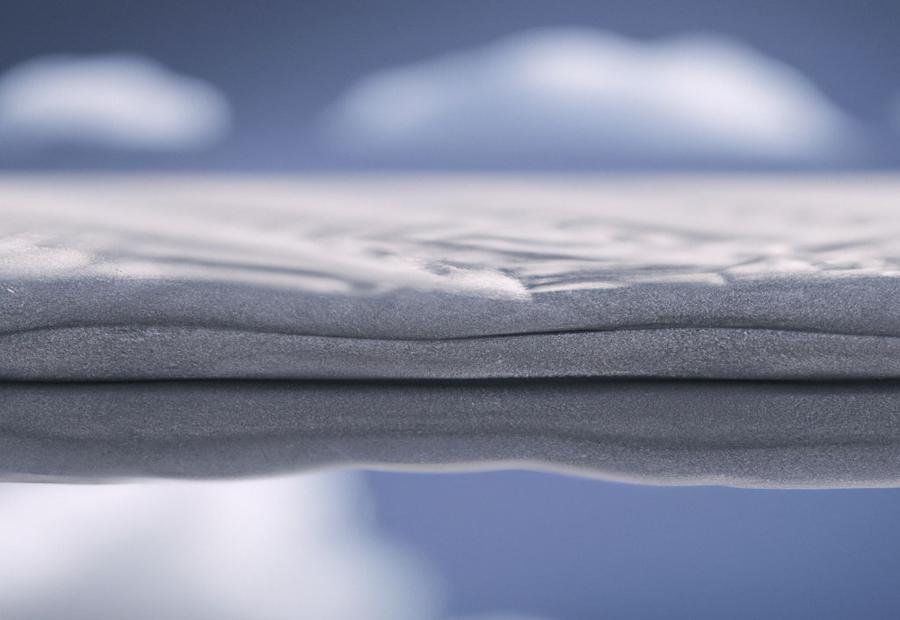
Photo Credits: Www.Mattressreviewguru.Com by Wayne Anderson
When it comes to choosing a full-size mattress, the thickness can make all the difference. In this section, we will dive into the various options available, from thin mattresses to standard thickness and even thick mattresses. Discover the benefits and considerations that come with each thickness option, allowing you to make an informed decision for a restful night’s sleep.
Thin Mattresses
A thin mattress has less thickness compared to standard or thick mattresses. They are lightweight and compact, so they are good for those who like a firmer bed. Also, they are great for people who have limited bedroom space, or need a portable option for camping or traveling. Plus, they are usually more affordable.
However, thin mattresses may not provide enough comfort and pressure relief for side sleepers. People with higher body weight may also find them uncomfortable.
It is important to consider your needs and preferences in terms of comfort and support when looking for the right mattress thickness. Test out different options, and seek advice from professionals for tailored insights. Finally, the perfect thickness for a good night’s sleep is the one that is just right for you!
Standard Thickness Mattresses
Standard thickness mattresses have multiple benefits. They can align your spine based on sleep position, cushion and support body weight, and provide a medium level of firmness. Plus, they strike a balance between thin and thick mattresses with sufficient padding for support. Some even come with features such as motion isolation and temperature regulation.
A great tip when deciding on the right mattress thickness: test out different options first. This way, you’ll know which feels best for your specific needs.
Bottom line: if you need more cushion, consider a thicker mattress!
Thick Mattresses
Thick mattresses boast a unique sleeping experience. Bigger in depth, they provide optimal comfort and can fit different sleep stances and body weights. Pressure points are eased, promoting correct spinal alignment for superior sleep quality.
- Proper Alignment: Thick mattresses keep spine alignment in check, reducing the risk of back pain.
- Enhanced Support: The extra thickness gives better support to those with higher body weight.
- Pressure Relief: Thick mattresses spread out body weight evenly, relieving strain on joints and muscles.
- Added Comfort: The extra cushioning of thick mattresses provides a plush surface for ultimate comfort.
- Durability: Thicker mattresses usually last longer, making them a smart purchase.
Full size mattresses come in various thicknesses. Thick ones are a popular pick for those seeking extra comfort and support. However, it’s important to consider personal preferences such as sleep position, body weight, and individual comfort before settling on the right thickness.
I myself recently switched to a thick mattress and the results were remarkable. The added cushioning provided great support and I woke up feeling relaxed and pain-free. The investment really paid off in improved sleep quality.
Discover the advantages and disadvantages of each mattress thickness and find the perfect fit for your sleep needs.
Pros and Cons of Different Thickness Options
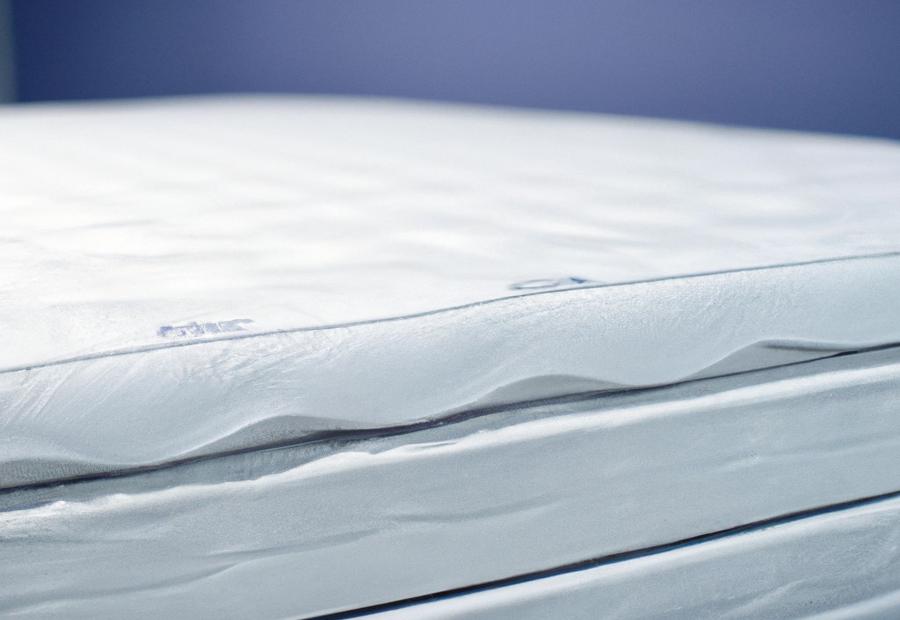
Photo Credits: Www.Mattressreviewguru.Com by Keith Hill
When it comes to choosing the thickness of a full-size mattress, weighing the pros and cons of different options is crucial. From the benefits of thin mattresses to the drawbacks of thick ones, we’ll uncover the various aspects you should consider before making your decision. So, let’s dive into the depths of mattress thickness and explore the potential advantages and disadvantages of each choice.
Pros of Thin Mattresses
Thin mattresses have various perks that make them a preferred pick for sleepers. These mattresses are thinner in height than standard or thick mattresses, and have quite a few benefits that can enhance the sleeping experience.
- Easy to move around: Thin mattresses are much lighter and easier to handle than thicker ones. This is great for people who often have to move or transport their mattress.
- Space-saving: Thin mattresses take up less vertical space – perfect for smaller bedrooms or shared living areas.
- Budget-friendly: Thin mattresses are often cheaper than thicker ones, so they’re ideal for those who want a comfy sleeping surface without spending too much.
- Firmer support: Thinner mattresses provide firmer support due to fewer cushioning layers. This is great for those who like a firmer feel or need extra support for proper spinal alignment.
- Compatibility with adjustable beds: Thin mattresses are usually more compatible with adjustable beds, so you can enjoy customized positioning without compromising on comfort.
- Cooler sleep: Thinner mattresses are less likely to accumulate body heat, which helps promote better airflow and a cooler, more comfortable sleep environment.
However, thin mattresses might not be suitable for everyone. People who need more cushioning or have specific comfort preferences may find that thin mattresses don’t provide enough pressure relief. So, it’s essential to consider individual needs and preferences before choosing the right mattress thickness.
In summary, thin mattresses can offer a range of advantages like easy maneuverability, space-saving qualities, cost-effectiveness, firmer support, compatibility with adjustable bases, and cooler sleep. These benefits make them a popular choice among those looking for certain features in their mattress. But, for those who aren’t professional acrobats, thin mattresses are practically no better than sleeping on gravel.
Cons of Thin Mattresses
Thin mattresses possess many drawbacks to consider when picking one. For instance, they lack the necessary support for proper spine alignment and pressure release. This can cause discomfort and pain, specially for those with joint or back issues. In addition, thin mattresses are more prone to sagging and permanent indentations due to their lower padding and poorer quality materials.
Motion isolation is also reduced with a thinner mattress. Therefore, movement on one side of the bed can be felt by the other. This can affect sleep for both persons. The mattress surface is less cushioned, leading to less comfort and more pressure points during sleeping. Additionally, noise and vibrations may not be absorbed properly if the mattress is too thin.
Despite the cons, some individuals may prefer thin mattresses for their own reasons. It’s recommended to try out different thicknesses before making a decision. Furthermore, because of the reduced thickness, these mattresses may be more susceptible to wear and tear. Durability must be taken into account when selecting a thin mattress.
In conclusion, thin mattresses may provide affordability and portability, but come with several drawbacks regarding support, durability, motion isolation, comfort, and noise absorption. These should be weighed against personal requirements and preferences when choosing a full-size mattress.
Pros of Standard Thickness Mattresses
Standard thickness mattresses boast a range of advantages which make them a popular pick for sleepers. These mattresses, which are averagely thick, give a balance of comfort and support for many people.
- They provide excellent support, with a medium level of firmness, to help keep your spine aligned and reduce pressure points.
- Widely available in various sizes and materials, so you can easily find one that suits you.
- Cost-effectiveness, as they are often more affordable than thicker or thinner options.
- Motion isolation helps ensure that one sleeper’s movements won’t disturb the other.
Remember to take into account individual needs and preferences when selecting a mattress. Also, testing different options before deciding is a smart way to determine the best thickness for your personal comfort.
Standard thickness mattresses – because being average has its advantages too!
Cons of Standard Thickness Mattresses
Standard thickness mattresses may have some drawbacks. When choosing a full-size mattress, these cons should be taken into account.
- Support issues: These mattresses may not provide enough support, particularly for those with medical conditions or back troubles. This can cause misalignment in the spine and discomfort.
- Durability: Standard thickness mattresses tend to not last as long as thicker ones. The materials can wear out quickly, resulting in sagging or deterioration.
- Less cushioning: Thicker mattresses usually offer more cushioning and pressure relief. Standard thickness mattresses may not be as comfortable.
- Motion isolation: Thinner mattresses often do not have good full size mattress capabilities. Movements on one side could be felt more on the other, disrupting sleep for couples.
- Versatility: People who want a plush or extra-firm feel may find limited options with standard thickness mattresses.
Note that these cons are not complete. It is important to consider personal preferences, body type, and needs before deciding on mattress thickness.
Pros of Thick Mattresses
Thick mattresses offer various advantages that enhance your sleep. These include: comfort, support, and longevity.
Comfort: Thick mattresses give a cushiony feel, making for a delightful and plush sleeping surface. Plus, the extra layers of padding and foam provide great pressure relief.
Support: Mattresses with thicker layers of supportive materials (e.g. coils or high-density foam) hold your body in the right spinal alignment. This is especially useful for those with back or joint problems.
Durability: Thicker construction makes for a mattress that lasts longer. This means more wear and tear resistance over the years, making it a cost-effective investment.
Motion isolation: The added thickness of thick mattresses absorbs and dissipates motion. This reduces disturbances caused by movements during sleep, making sure one partner’s sleep isn’t disrupted by the other’s.
In conclusion, a thick mattress can ensure superior comfort, support, durability, and motion isolation. All of these lead to a better sleep experience.
Cons of Thick Mattresses
Thick mattresses may have perks, but they also have certain drawbacks to be aware of before settling on one.
- Breathability may be hindered. With more layers and padding, airflow is restricted, leading to trapped heat and discomfort.
- Customization is limited. There’s no adjusting a full size mattress into a couch to individual preferences – firmness and softness are pre-determined.
- Moving is a chore. Thick mattresses are bulky and heavy, making them a labor-intensive job to transport.
- Costly. Thicker mattresses often come at a higher price tag due to the materials and construction.
- May not suit. Thickness can be beneficial for some sleepers, but too firm or overwhelming for others.
Think it through! Take into account advantages and disadvantages before selecting a thick mattress. Consider personal needs and preferences for optimal comfort and quality rest.
Tips for Choosing the Right Thickness for Your Full Size Mattress
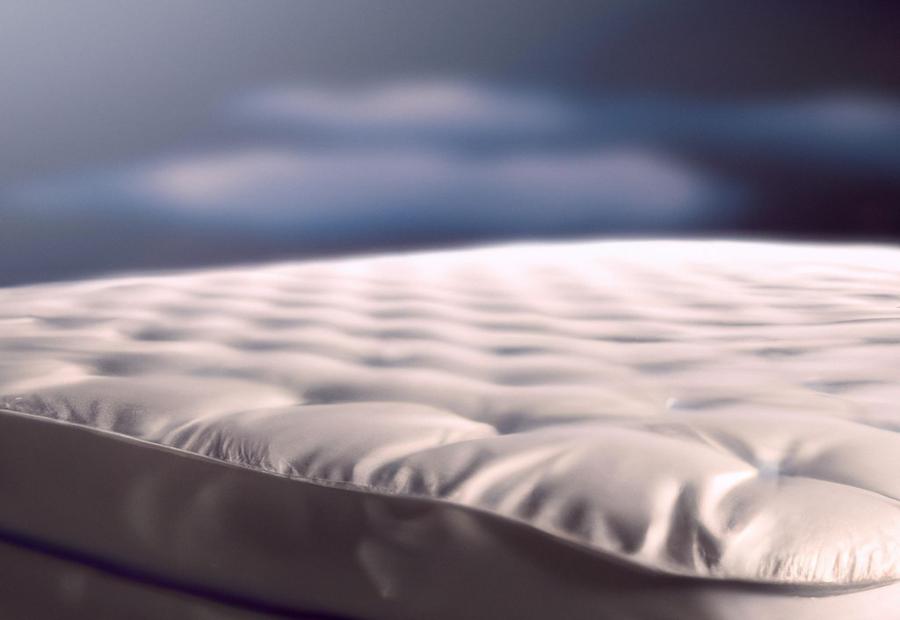
Photo Credits: Www.Mattressreviewguru.Com by Arthur White
Choosing the right thickness for your full-size mattress is crucial for a good night’s sleep. If you consider factors like your sleeping position, support needs, and seek expert advice, you can make an informed decision. Testing different thickness options can also help you find the perfect fit. So, let’s explore some tips to guide you in selecting the ideal thickness for your full-size mattress.
Consider Your Sleeping Position and Support Needs
It’s important to consider your sleeping position and support needs when choosing a full-size mattress. Your sleeping position plays a major role. For instance, side-sleepers need a thicker mattress for more cushioning. But, back or stomach sleepers should go for a thinner one to get the right spinal alignment.
Weight and comfort preferences also affect your support needs. Heavier people need thicker mattresses to prevent sinking in. People with joint or back issues may prefer thicker ones for pressure relief and support.
You should get an appropriate thickness for your full-size mattress. Know how thickness options impact support and comfort. Test out various thicknesses and get expert advice to get the perfect fit. Like Goldilocks, it’s all about finding the mattress that’s “just right”!
Test Different Thickness Options
To find the best fit for your needs, try out different thicknesses of mattresses. Consider sleeping position, body weight, and comfort. Make a table comparing thin, standard, and thick mattresses. Note pros and cons of each based on support, quality, and durability. In-person testing at mattress stores is important. Seek advice from mattress professionals too. This way you can choose the right thickness for your full-size mattress. It will give you a tailored sleep experience for better sleep quality.
Seek Expert Advice
When it comes to deciding on a full size mattress’ thickness, seeking expert advice is essential. Experts possess the knowledge and experience to provide valuable insights and personalized guidance. They assess an individual’s sleeping position, body weight, and comfort preferences to determine the best mattress thickness for them. Furthermore, experts stay up-to-date with the latest trends and advancements in the mattress industry, allowing them to offer the most relevant information.
Receiving expert advice can also save individuals time and money as they navigate through different options to find one that meets their specific needs. This includes considering factors beyond just thickness, such as material construction, durability, warranty, and cost-effectiveness. With the help of an expert, individuals can make a well-informed decision and enjoy long-term satisfaction with their full size mattress.
Online research can be helpful, however it cannot replace the expertise of a professional consultation or discussion. Expert opinions are based on in-depth knowledge and understanding of the industry, making them invaluable for choosing the right mattress thickness. According to an article titled ‘How Thick is a Full Size Mattress’, seeking expert advice can lead to improved sleep quality (Reference: How Thick is a Full Size Mattress). In conclusion, sleeping on a thin mattress is like trying to nap on a tortilla, while a thick mattress is like sinking into a coma-inducing marshmallow.
Conclusion
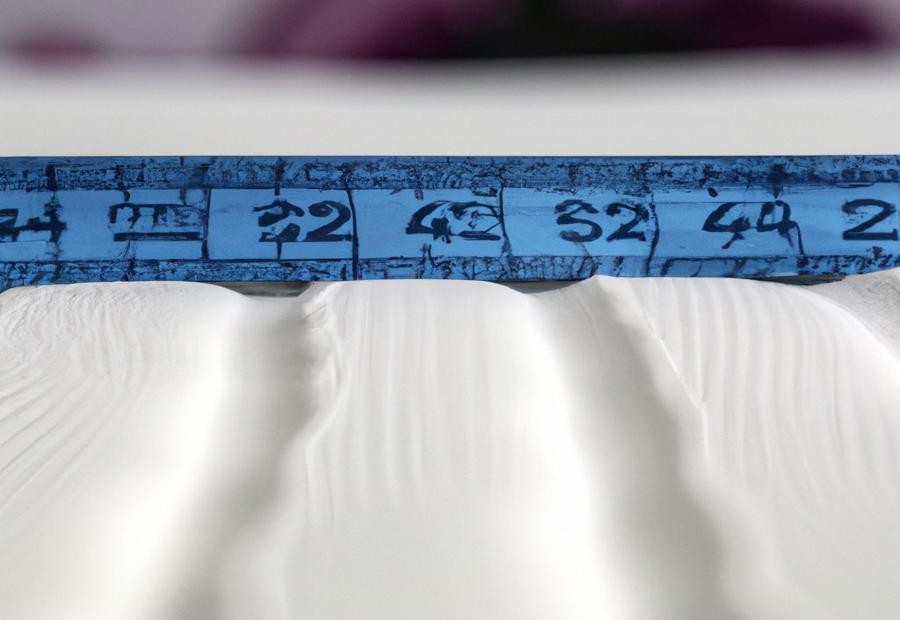
Photo Credits: Www.Mattressreviewguru.Com by Aaron Martinez
Full size mattresses are usually 54 inches wide and 75 inches long. But the thickness can differ – from 8 to 14 inches. This difference gives people options for comfort and support. Manufacturers use foam, padding, and springs to make the mattress feel just right. It is important to decide which thickness suits you best. Experimenting with different thicknesses can help you get the sleep you need. You can learn more about how to move a King Purple mattress to make the right choice.
References
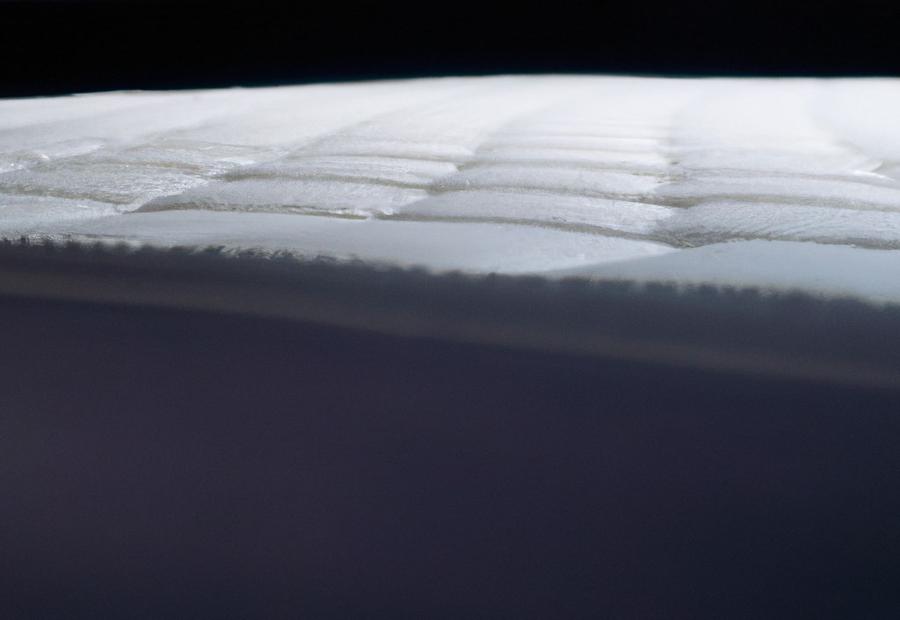
Photo Credits: Www.Mattressreviewguru.Com by Willie Moore
Full-size mattresses are a common choice for double beds, typically 54 inches wide and 75 inches long. The thickness of a full-size mattress may lie anywhere between 8 to 12 inches, depending on the brand and model. Reference the product specifications or consult with a sales representative to determine the exact thickness.
When selecting a mattress, consider the bed frame height and desired comfort level. A thicker mattress offers more cushioning, but may be challenging to get in and out of bed. Whereas, a thinner mattress is firmer, and suitable for those who prefer a lower bed height. Test out different mattress thicknesses and seek advice from a sleep specialist for personalised recommendations.
Full-size mattresses have been around since the early days of bedding, and their dimensions were established based on extensive research of human body proportions. Today, they remain a popular choice for bedrooms, guest rooms and smaller living spaces thanks to their size and availability.
Some Facts About How Thick is a Full Size Mattress:
- ✅ The ideal thickness for a full-size mattress is 7-8 inches with a comfort layer of 3 or 4 inches and a support layer of 3-5 inches. (Source: Team Research)
- ✅ A good quality memory foam full-size mattress should be 10 to 14 inches thick. (Source: https://nectarsleep.com)
- ✅ An ideal thickness for a latex full-size mattress is 8 to 11 inches. (Source: https://eachnight.com)
- ✅ A full-size top bunk mattress should be 6 or 7 inches thick for good quality. (Source: https://eachnight.com)
- ✅ Thicker full-size mattresses provide more cushioning and support, but they can be more expensive and heavier. (Source: https://amerisleep.com)
FAQs about How Thick Is A Full Size Mattress
How thick is a full-size mattress?
A full-size mattress typically ranges in thickness from 8 to 14 inches, depending on the brand and model. This thickness ensures a balance of comfort and support for most individuals.
What is the role of the base layer in a mattress?
The base layer, also known as the foundation layer, provides durability and support to the mattress. It is typically made of materials such as coils, poly-foam, or latex foam, and contributes to the overall thickness and stability of the mattress.
Is a full-size mattress suitable for sharing a bed with a partner?
Yes, a full-size mattress can accommodate two individuals, but it may be a bit snug for couples who prefer more space. If you and your partner like extra room to move around during sleep, you may want to consider a larger mattress size, such as a queen or king.
Can back sleepers benefit from a full-size mattress?
Yes, full-size mattresses can be suitable for back sleepers. Back sleepers generally require medium-firm mattresses that provide support to maintain proper spinal alignment. It is important to choose a mattress thickness and firmness level that suits your comfort preferences and promotes healthy sleep posture.
Are air mattresses available in full-size and suitable for everyday use?
Yes, air mattresses are available in full-size and can be used for everyday sleep. However, it is important to choose a high-quality air mattress designed for regular use, as some air mattresses may not provide the same level of comfort and durability as traditional mattresses.
What mattress materials are commonly used in full-size mattresses?
Full-size mattresses can be made of various materials, including memory foam, latex foam, coils, and poly-foam. Each material offers unique qualities such as contouring comfort, pressure relief, responsiveness, or support. Choosing the right material depends on individual preferences and specific sleep needs.

